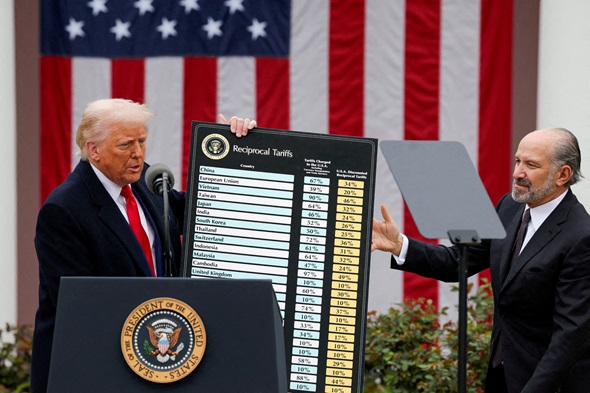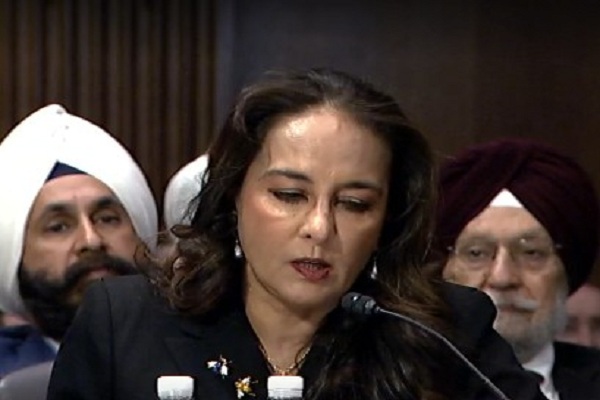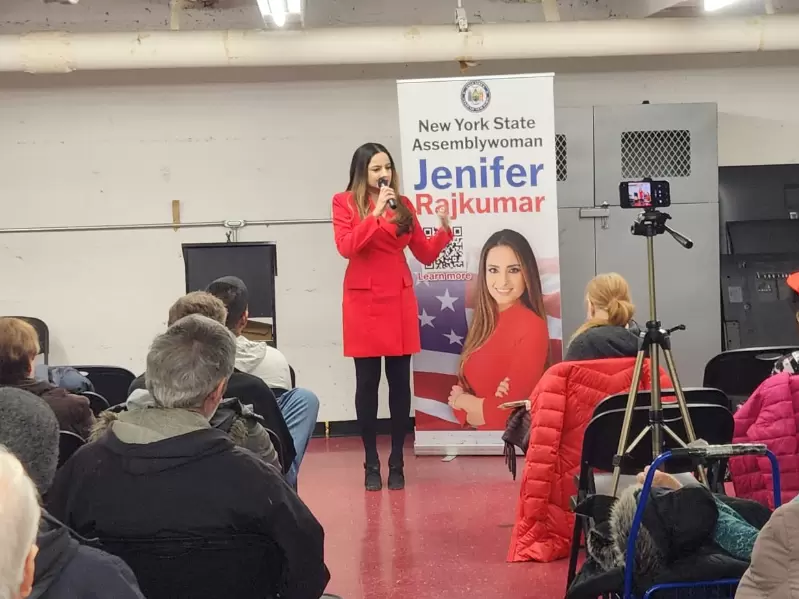A dozen US states decry Trump's "blank check" tariffs in lawsuit
A three-judge panel of the Manhattan-based Court of International Trade heard arguments in a lawsuit brought by the Democratic attorneys general of New York, Illinois, Oregon, and nine other states.
 Donald Trump. / REUTERS/Carlos Barria
Donald Trump. / REUTERS/Carlos Barria
Twelve U.S. states asked a federal court on May 21 to halt President Donald Trump's "Liberation Day" tariffs, arguing that he overstepped his authority by declaring a national emergency to impose across-the-board taxes on imports from nations that sell more to the U.S. than they buy.
A three-judge panel of the Manhattan-based Court of International Trade heard arguments in a lawsuit brought by the Democratic attorneys general of New York, Illinois, Oregon, and nine other states. They did not immediately rule on whether the tariffs are legal. A decision is expected in the coming weeks.
The states said the Republican president has badly misinterpreted a law called the International Emergency Economic Powers Act to justify the tariffs, treating it as a "blank check" to regulate trade.
Trump has incorrectly claimed that IEEPA allows him to "set tariffs of any amount, on any country, for any length of time, and no court can review it," Brian Marshall, an attorney for the state of Oregon, said in court.
But that law is meant to address "unusual and extraordinary" threats to the U.S., and it requires presidential actions to be closely tied to a specific emergency, Marshall said. A president cannot use tariffs or other actions "only for leverage" under IEEPA, Marshall said.
The Justice Department's Brett Shumate argued for the administration that leverage is a valid reason to impose tariffs under IEEPA, which he said empowers the president to negotiate trade deals and other foreign policy goals.
"The purpose of these tariffs is to create pressure," Shumate said. "The tariffs are right now giving the president the leverage that he needs."
The judges asked pointed questions of attorneys on both sides, probing how far the court can go to second-guess the tariffs.
Judge Jane Restani, appointed by Republican President Ronald Reagan, pressed Shumate on his argument that only Congress, not U.S. states or the courts, can review a president's actions taken in response to an IEEPA emergency.
"Nothing is so crazy or unrelated that it could be stopped by the courts?" Restani asked.
Shumate said courts cannot review whether the president has acted reasonably once his emergency powers are triggered. Tariffs are included under IEEPA's authority to "investigate, regulate, or prohibit" transactions, even if the law does not use the word "tariff," he said.
When Restani pushed Shumate to come up with an example of a presidential action that would fall outside of the "investigate, regulate or prohibit" framework, he said "it is hard for me to imagine what that would be."
Meanwhile, Judge Gary Katzmann, appointed by Democratic President Barack Obama, pressed the states' lawyer on whether the court should act as a "backseat driver to the president" on issues that implicate foreign policy.
Marshall said the president's actions must be a "reasonable" response to an emergency, or else that authority could be expanded without limits.
ON-AGAIN, OFF-AGAIN
Trump has said the decades-long U.S. history of importing more than it exports is a national emergency that has harmed manufacturers.
The states argue the U.S. trade deficit is not an "emergency" and that IEEPA does not authorize tariffs at all.
After imposing tariffs on China, Mexico and Canada in February as a way to stop illegal fentanyl from entering the U.S., Trump imposed a 10 percent across-the-board tariff on all imports in April, with higher rates for countries with which the U.S. has the largest trade deficits, particularly China.
The president cited IEEPA for both sets of tariffs, but the states say that tariffs are not a reasonable response to either routine trade deficits or fentanyl trafficking.
Many of the country-specific tariffs imposed in April were paused a week later, and the Trump administration temporarily reduced the steepest tariffs on China this month while working on a longer-term trade deal.
Trump's on-again, off-again tariffs have shocked U.S. markets. He has framed them as a way to restore U.S. manufacturing capability.
The states' lawsuit is one of at least seven court challenges to Trump's tariff policies. California has filed a separate challenge in federal court in San Francisco, and other lawsuits have been filed by businesses, legal advocacy groups and members of the Blackfeet Nation.
The same three-judge panel heard arguments last week in a similar case brought by five small businesses, and it is expected to rule in that case in the coming weeks.
Decisions from the court, which hears disputes involving international trade and customs laws, can be appealed to the U.S. Court of Appeals for the Federal Circuit in Washington, D.C., and ultimately the U.S. Supreme Court.
ADVERTISEMENT
ADVERTISEMENT
E Paper
Video




 Reuters
Reuters













Comments
Start the conversation
Become a member of New India Abroad to start commenting.
Sign Up Now
Already have an account? Login